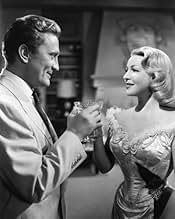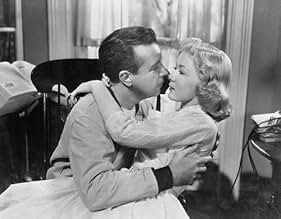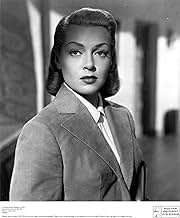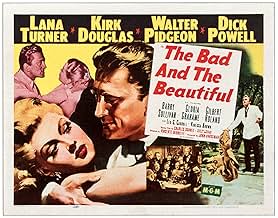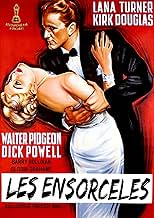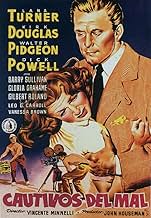CALIFICACIÓN DE IMDb
7.7/10
17 k
TU CALIFICACIÓN
Un productor de películas sin escrúpulos utiliza a una actriz, un director y un escritor para alcanzar el éxito.Un productor de películas sin escrúpulos utiliza a una actriz, un director y un escritor para alcanzar el éxito.Un productor de películas sin escrúpulos utiliza a una actriz, un director y un escritor para alcanzar el éxito.
- Dirección
- Guionistas
- Elenco
- Ganó 5 premios Óscar
- 7 premios ganados y 7 nominaciones en total
Jay Adler
- Mr. Z - Party Guest
- (sin créditos)
Stanley Andrews
- Sheriff
- (sin créditos)
Del Armstrong
- Georgia's Makeup Artist - Screen Test Scene
- (sin créditos)
Ben Astar
- Joe - Party Guest
- (sin créditos)
Barbara Billingsley
- Evelyn Lucien - Costumer
- (sin créditos)
- Dirección
- Guionistas
- Todo el elenco y el equipo
- Producción, taquilla y más en IMDbPro
Opiniones destacadas
A story of betrayals and misunderstandings in the festering underbelly of Hollywood; this is Vincente Minnelli's cool expose of the workings of a producer (Kirk Douglas, as one of the movies' great detestable characters) and the effect he has on those who come into contact with him: a director who feels abandoned yet goes on to produce his greatest work (Barry Sullivan); an actress who is rescued from semi-alcoholism and turned into a star (Lana Turner, in one of her trademark parts); and a prize-winning novelist who is uprooted to shape his book for the screen (Dick Powell, in one of his last film roles before moving into television and film directing).
We see their stories in a series of flashbacks, linked by the three enemies of Douglas coming together in the office of studio biggie Walter Pidgeon who coolly reminds them of the good things the producer brought to their lives along with the bad. There are other good performers in smaller roles Gloria Grahame as Powell's twittery wife, Gilbert Roland as the Latin temptation, and so on. The Bad and the Beautiful', filmed in good old black and white, has plenty of meat to keep you watching. Only the slightly twee ending lets it down, but you can't have everything.
We see their stories in a series of flashbacks, linked by the three enemies of Douglas coming together in the office of studio biggie Walter Pidgeon who coolly reminds them of the good things the producer brought to their lives along with the bad. There are other good performers in smaller roles Gloria Grahame as Powell's twittery wife, Gilbert Roland as the Latin temptation, and so on. The Bad and the Beautiful', filmed in good old black and white, has plenty of meat to keep you watching. Only the slightly twee ending lets it down, but you can't have everything.
Glossy MGM soaper has many things to recommend it, not the least of which is a surprisingly grounded, natural Lana Turner (looking great, even in ordinary jammies) playing a successful movie actress who, along with a top screenwriter and director, help producer-on-the-skids Kirk Douglas stage a comeback. Not especially revealing about Hollywood, which at this stage wasn't quite ready to unmask itself, but still engaging and intriguing. Douglas is well-cast (he spits out his lines with a terse jaw--nothing new--but he's right for this part and is commendable). Turner is a revelation and deserved at the very least an Oscar nomination for her work; the picture did go on to win Academy Awards in five categories, including Gloria Grahame as Best Supporting Actress; Charles Schnee, Best Screenplay; Robert Surtees, Best Cinematography, Black-and-White; Best Art Direction-Set Decoration, Black-and-White; and Best Costume Design, Black-and-White. Well-directed by Vincente Minnelli, the picture gets less attention than something like "All About Eve", but it's actually more entertaining. *** from ****
"The Bad and the Beautiful" takes a look at Hollywood. This incisive take about how movies are made, directed by Vincente Minnelli, dares to go behind the scenes to show what goes on in the way the film industry operates. The film adaptation by Charles Schnee gives us a good idea of that unreal world of fantasy and hype.
At the center of the story is Jonathan Shields, a young man with connections to the industry. He wants to follow his father's footsteps and goes at it vigorously, making friends and enemies along the way. Jonathan discovers he can be ruthless whenever he wants. His first victim is Fred Amiel, the talented director who Jonathan bypasses in favor of a more established one. Jonathan quickly forgets the friendship Fred and his wife showed him before becoming a big producer.
Then there is there is Georgia Larrion, the boozy daughter of a famous actor. Jonathan shows how he wants Georgia to succeed in the business, personally taking care of selling her to star in his big project, only to betray her with another woman, a glamorous bit player. When Georgia discovers the truth, she flees Jonathan's mansion in a clear night that suddenly turns into a torrential downpour and loses control of the car, but she doesn't suffer a scratch!
The last victim of Mr. Shields is the Pulitzer prize winner, James Lee Bartlow, who Jonathan coaxes into leaving his academic life to adapt his own novel for the movies. James is married to the flighty Rosemary, in whom Jonathan discovers a weak link that will do anything to hobnob with the celebrities. Jonathan makes it easy for Rosemary to fall into an affair with the star of Shields' film.
When we first watched this film, it seemed much better, than on this viewing where a lot of things surface to make some of the story much weaker than before. Some viewers have compared this film with the fate of Orson Welles in Hollywood, and there are a couple of references that could be interpreted that way. Whether it was so, or not, it's up to the viewer to guess where the truth lies.
Kirk Douglas gave a strong performance as Jonathan Shields. Mr. Douglas showed he clearly understood who this man was. He runs away with the film, in our humble opinion. Lana Turner, a beautiful presence in any movie, is good, but at times she appears to be overwhelmed by the range of emotions she has to project, especially with that phony car scene.
Dick Powell and Gloria Graham put in an excellent appearance as the Bartlows. Barry Sullivan disappears after Lana shows up, not to be seen until the end. Walter Pigeon is effective as the studio head. Gilbert Roland is perfect as Gaucho, the Latin actor with a lot of charisma.
Mr. Minnelli shows he wasn't afraid to portray the industry the way we see it in the film, not a small accomplishment, knowing well how it could have backfired on him. Hollywood is not forgiving to those who dare to show its ugly side and that's when the parallel with Orson Welles problems with the system and eventual exile can be drawn.
At the center of the story is Jonathan Shields, a young man with connections to the industry. He wants to follow his father's footsteps and goes at it vigorously, making friends and enemies along the way. Jonathan discovers he can be ruthless whenever he wants. His first victim is Fred Amiel, the talented director who Jonathan bypasses in favor of a more established one. Jonathan quickly forgets the friendship Fred and his wife showed him before becoming a big producer.
Then there is there is Georgia Larrion, the boozy daughter of a famous actor. Jonathan shows how he wants Georgia to succeed in the business, personally taking care of selling her to star in his big project, only to betray her with another woman, a glamorous bit player. When Georgia discovers the truth, she flees Jonathan's mansion in a clear night that suddenly turns into a torrential downpour and loses control of the car, but she doesn't suffer a scratch!
The last victim of Mr. Shields is the Pulitzer prize winner, James Lee Bartlow, who Jonathan coaxes into leaving his academic life to adapt his own novel for the movies. James is married to the flighty Rosemary, in whom Jonathan discovers a weak link that will do anything to hobnob with the celebrities. Jonathan makes it easy for Rosemary to fall into an affair with the star of Shields' film.
When we first watched this film, it seemed much better, than on this viewing where a lot of things surface to make some of the story much weaker than before. Some viewers have compared this film with the fate of Orson Welles in Hollywood, and there are a couple of references that could be interpreted that way. Whether it was so, or not, it's up to the viewer to guess where the truth lies.
Kirk Douglas gave a strong performance as Jonathan Shields. Mr. Douglas showed he clearly understood who this man was. He runs away with the film, in our humble opinion. Lana Turner, a beautiful presence in any movie, is good, but at times she appears to be overwhelmed by the range of emotions she has to project, especially with that phony car scene.
Dick Powell and Gloria Graham put in an excellent appearance as the Bartlows. Barry Sullivan disappears after Lana shows up, not to be seen until the end. Walter Pigeon is effective as the studio head. Gilbert Roland is perfect as Gaucho, the Latin actor with a lot of charisma.
Mr. Minnelli shows he wasn't afraid to portray the industry the way we see it in the film, not a small accomplishment, knowing well how it could have backfired on him. Hollywood is not forgiving to those who dare to show its ugly side and that's when the parallel with Orson Welles problems with the system and eventual exile can be drawn.
Producer Jonathan Shields is in big trouble on a production and reaches out to three people he's befriended and betrayed in the past for help. All three are brought to Harry Pebbel's office where he makes a pitch for the help of each one. And we're told in flashback the dynamics of the relationships between Shields and each one.
One thing about Tinseltown, they've never been afraid to show the seamier side of movie-making. Kirk Douglas's Jonathan Shields is a not too thinly disguised version of David O. Selznick. The same drive, the same ambition, the same overwhelming ego that Selznick was legendary for is a part that was tailor made for Kirk Douglas.
The three betrayed people, director Fred Amiel(Barry Sullivan), star Georgia Lorrison(Lana Turner), and screenwriter James Lee Barlow(Dick Powell)all ring very true. One of the things I like about this film is that all three stories, each in itself, could be expanded into a film all it's own.
Lana Turner's role as the ersatz Diana Barrymore is not to hard to spot either. It's so much better here than the film based on her own book Too Much Too Soon. If that voice of Turner's actor father on those 78 rpms she's playing sounds familiar, it's that of Louis Calhern. Turner's was a life lived out all too well in the tabloids and she brings all of it to bear in playing Gerogia Lorrison.
Dick Powell, who was offered the lead as Jonathan Shields, opted to play tweedy professor turned screenwriter James Lee Barlow. This was Powell's next to last feature picture as an actor, it should have been the one he went out on. Powell was always ahead of the industry's cutting edge and he decided to concentrate more on directing and acting for the small screen.
Powell's segment includes Gloria Grahame as his flirty wife. Post World War II Hollywood, whenever it had a part for a tramp, first call Gloria Grahame. Here she responds with an Academy Award winning performance. She hasn't many scenes, but as was said in another MGM picture around that time, what there is is cherce.
I don't think there's ever been an actor who can go from zero to sixty on the emotional scale as quickly as Kirk Douglas. Check the scene when Lana Turner discovers how Douglas betrayed her. The intensity of his reaction alone is frightening and real. Douglas was also up for an Oscar, but it went that year to laconic Gary Cooper in High Noon.
Vincente Minelli put all the pieces together just right and it comes out great entertainment.
One thing about Tinseltown, they've never been afraid to show the seamier side of movie-making. Kirk Douglas's Jonathan Shields is a not too thinly disguised version of David O. Selznick. The same drive, the same ambition, the same overwhelming ego that Selznick was legendary for is a part that was tailor made for Kirk Douglas.
The three betrayed people, director Fred Amiel(Barry Sullivan), star Georgia Lorrison(Lana Turner), and screenwriter James Lee Barlow(Dick Powell)all ring very true. One of the things I like about this film is that all three stories, each in itself, could be expanded into a film all it's own.
Lana Turner's role as the ersatz Diana Barrymore is not to hard to spot either. It's so much better here than the film based on her own book Too Much Too Soon. If that voice of Turner's actor father on those 78 rpms she's playing sounds familiar, it's that of Louis Calhern. Turner's was a life lived out all too well in the tabloids and she brings all of it to bear in playing Gerogia Lorrison.
Dick Powell, who was offered the lead as Jonathan Shields, opted to play tweedy professor turned screenwriter James Lee Barlow. This was Powell's next to last feature picture as an actor, it should have been the one he went out on. Powell was always ahead of the industry's cutting edge and he decided to concentrate more on directing and acting for the small screen.
Powell's segment includes Gloria Grahame as his flirty wife. Post World War II Hollywood, whenever it had a part for a tramp, first call Gloria Grahame. Here she responds with an Academy Award winning performance. She hasn't many scenes, but as was said in another MGM picture around that time, what there is is cherce.
I don't think there's ever been an actor who can go from zero to sixty on the emotional scale as quickly as Kirk Douglas. Check the scene when Lana Turner discovers how Douglas betrayed her. The intensity of his reaction alone is frightening and real. Douglas was also up for an Oscar, but it went that year to laconic Gary Cooper in High Noon.
Vincente Minelli put all the pieces together just right and it comes out great entertainment.
That one line summary makes me sound like I'm calling the Bad and the
Beautiful a case in 'tough love', where director Vincente Minnelli wags
his finger at what happens to some people (cough, David O. Selznick,
cough), while also showing too the joys of working in the business. But
it's a business at its most booming time, coming out of the 40s where
the producer was king, and the director had to vie for room at times to
really get his vision in. Here the producer Jonathan Shields is played
by Kirk Douglas as someone with big ideas at first- he even has an idea
to help make a scary movie about cats even more frightening by not
showing the cats (echoes of Val Lewton). Soon he rises the ranks and
becomes big enough to really call the shots all he wants, but it also
gets in the way of personal relationships, severs ties, and sometimes
even makes him out to be monstrous (there's one shot I remember all the
time where Douglas, in a big fit of anger against Lana Turner's
character, seems like he's a whole foot taller with the ego almost
manifested). The narrative of the film is a retelling by people who
knew him, a sexy but soon disillusioned actress, a director who once
worked with Shields but then got cut off from him, and a writer played
by Dick Powell.
Rashomon or Citizen Kane it is not in trying to reveal more grandiose and amazing things about human nature, but rather a supreme rumination on the good times and the bad times, possibly more of the latter.
What's great about Douglas's portrayal is that through the stories from the three ex-friends and co-workers and lovers, he becomes a very well-rounded character. At the core, of course, is the producer who at the time had as more creative say than anyone else on the set. This brings some of the great scenes ever shown about movie-making, such as the moment when Amiel, the director, tries to put Jonathan in his place about how a scene should be shot, "in order to direct a picture you need humility". Another comes with the moment when Jonathan and his soon to be 'asistant to the producer' has to object out of just being stunned. But more than Douglas, it's also tremendous, memorable screen time for Lana Turner, perhaps in her most successful performance in just sheer acting terms (not necessarily just in presence or style like in other pictures), and for Dick Powell, who with this and Murder My Sweet has two defining roles outside of his usual niche.
With many sweet camera moves, a script that crackles with the kind of scenes and dialog that makes one wish for the glory times of Hollywood's Golden Age, and at least four or five really excellent performances, The Bad and the Beautiful might not be as astounding and near-perfect as 8 1/2 or as funny as Bowfinger, but it ranks up there with the best movies about movie-making, and can make for some fine entertainment even for those who aren't really interested in how movies are made.
Rashomon or Citizen Kane it is not in trying to reveal more grandiose and amazing things about human nature, but rather a supreme rumination on the good times and the bad times, possibly more of the latter.
What's great about Douglas's portrayal is that through the stories from the three ex-friends and co-workers and lovers, he becomes a very well-rounded character. At the core, of course, is the producer who at the time had as more creative say than anyone else on the set. This brings some of the great scenes ever shown about movie-making, such as the moment when Amiel, the director, tries to put Jonathan in his place about how a scene should be shot, "in order to direct a picture you need humility". Another comes with the moment when Jonathan and his soon to be 'asistant to the producer' has to object out of just being stunned. But more than Douglas, it's also tremendous, memorable screen time for Lana Turner, perhaps in her most successful performance in just sheer acting terms (not necessarily just in presence or style like in other pictures), and for Dick Powell, who with this and Murder My Sweet has two defining roles outside of his usual niche.
With many sweet camera moves, a script that crackles with the kind of scenes and dialog that makes one wish for the glory times of Hollywood's Golden Age, and at least four or five really excellent performances, The Bad and the Beautiful might not be as astounding and near-perfect as 8 1/2 or as funny as Bowfinger, but it ranks up there with the best movies about movie-making, and can make for some fine entertainment even for those who aren't really interested in how movies are made.
¿Sabías que…?
- TriviaAt 9 minutes and 32 seconds, Gloria Grahame's performance in this movie became the shortest to ever win an Oscar. She held the record until 1976, when Beatrice Straight won for her 5 minute performance in Poder que mata (1976).
- ErroresThe story takes place over an 18-year period, roughly 1934-1952, but the hairstyles and clothing of all the women, from beginning to end, are strictly 1952.
- Versiones alternativasAlso available in a computer colorized version.
- ConexionesFeatured in Mundo, carne y deseo (1959)
Selecciones populares
Inicia sesión para calificar y agrega a la lista de videos para obtener recomendaciones personalizadas
- How long is The Bad and the Beautiful?Con tecnología de Alexa
Detalles
- Fecha de lanzamiento
- País de origen
- Idioma
- También se conoce como
- The Bad and the Beautiful
- Locaciones de filmación
- Productora
- Ver más créditos de la compañía en IMDbPro
Taquilla
- Presupuesto
- USD 1,558,000 (estimado)
- Total a nivel mundial
- USD 2,025
- Tiempo de ejecución1 hora 58 minutos
- Color
- Relación de aspecto
- 1.37 : 1
Contribuir a esta página
Sugiere una edición o agrega el contenido que falta

Principales brechas de datos
What is the Japanese language plot outline for Cautivos del mal (1952)?
Responda


